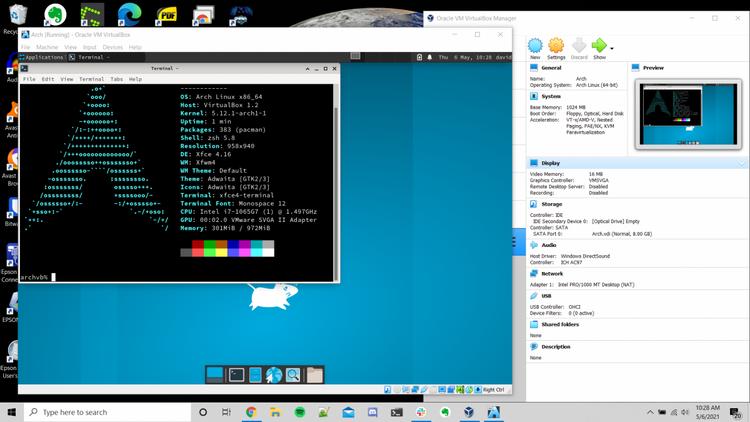www.makeuseof.com 5 Reasons to Use the Linux Desktop Instead of WSL
While WSL has made it easier for those who need to use both Windows and Linux on the same machine, there might still be reasons to use a real Linux desktop on your computer.
In this article, we discuss the various reasons why one would want to install a Linux desktop on their computer.
1. You Can Still Use Windows and Linux on the Same Machine
With a full Linux desktop, you don't have to give up your Windows programs. Linux has supported various ways to run Windows alongside Linux from the beginning.
The classic option is dual-booting, using a bootloader to choose between the two systems at boot time. You can also run Windows or desktop Linux in a virtual machine, depending on which system you use less frequently. If you want to run Windows programs, but you're dead-set on only running Linux, you can use Wine or Proton.
You have options when you want to run Windows and Linux apps. You could keep Windows around for games and other programs you need while using Linux to learn more about computers, programming, system administration, or operating systems in general. It's a nice division of labor.
Related: Dual Boot vs. Virtual Machine: Which One Is Right for You?
2. Using Linux Supports Free and Open-Source Software
The biggest reason to use Linux on the desktop is to support free and open-source software. Even if Microsoft is supporting Linux and making contributions to open-source software, Windows itself is still proprietary. Imagine writing that Microsoft would support a competitor's product 20 years ago!
MAKEUSEOF VIDEO OF THE DAY
Regularly using and contributing whatever you can to open-source projects, including money and code, as well as daily use, will help ensure the long-term viability of open-source software. That's one reason you should consider directly contributing to your favorite Linux distros and open-source software project.
3. Reporting Bugs Helps Improve Desktop Linux
There seems to be more interest in desktop Linux in the tech world, especially among PC enthusiasts. More gamers are getting interested in Valve's Steam Deck and coverage from major YouTubers like Linus Tech Tips.
Despite the greater attention, desktop Linux is rougher around the edges than Windows setups, with some work required to get some hardware like graphics cards and Wi-Fi adapters up and running.
This might deter some users, but the only way to fix bugs is to find them, and if you're serious about wanting desktop Linux to succeed, that would mean temporarily enduring bugs. If you run into trouble, you should file a report instead of just silently switching back to Windows.
The developers can't fix problems they don't know about. Finding bugs and fixing them will make Linux better for everyone in the long run.
4. You'll Learn More About Linux
While WSL may be fine for learning the Linux command line, if you want to learn about Linux, you'll need to run a full Linux distribution that includes the kernel, possibly a desktop, as well as the suite of applications.
If you want a career in IT, knowing about Linux system administration is essential. This means knowing how to boot the system, how to fix it when it breaks, and how to start and stop server processes. All of this requires hands-on experience.
While WSL 2 runs on a real Linux kernel, if you want all of this experience, you'll need to boot up a real Linux system. Fortunately, this experience is only a partition or virtual machine away.
5. More Linux Users Means Better Hardware Support
Linux desktop development has suffered from a chicken-and-egg problem. There's not as much support from hardware developers, so ordinary users don't use desktop Linux, which means that fewer developers support it in turn. This makes sites like the Linux Hardware Database important for many Linux users to check compatibility before installation.
With the growing interest in Linux gaming mentioned above, this could change. If there's greater support for gaming hardware, especially graphics cards, this could make desktop Linux a viable challenger to Windows, which has long dominated PC gaming.
Running a Full Linux Distro Can Be Better Than WSL
While WSL is a fine product, there are still situations where running a full Linux distro on the desktop can be better.
If you're on the fence about whether to stick to Linux or go back to the Windows desktop, read on for a pretty compelling case for the latter.
8 Reasons to Switch From Linux to Windows (Hear Us Out) Read NextShareTweetShareEmail Related TopicsAbout The AuthorDavid Delony(88 Articles Published)David is a freelance writer based in the Pacific Northwest, but originally hailing from the Bay Area. He has been a technology enthusiast since childhood. David's interests include reading, watching quality TV shows and movies, retro gaming, and record collecting.
MoreFrom David DelonyJoin our newsletter for tech tips, reviews, free ebooks, and exclusive deals!








